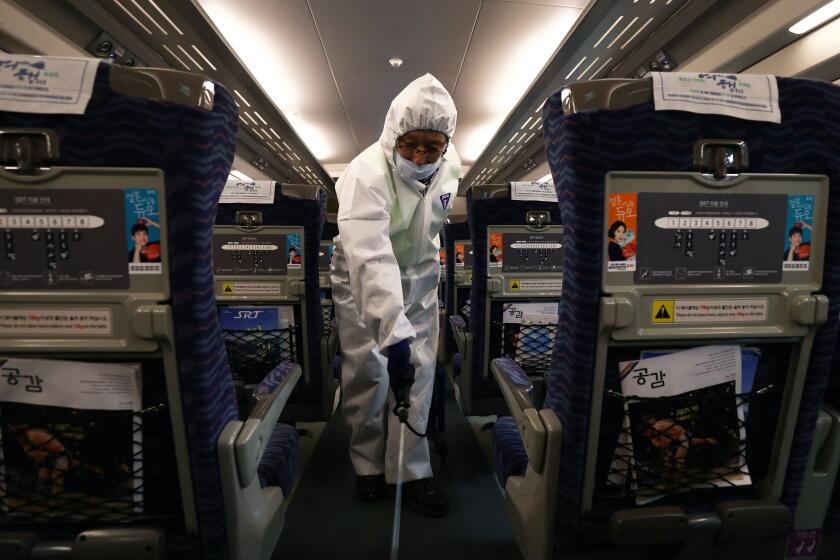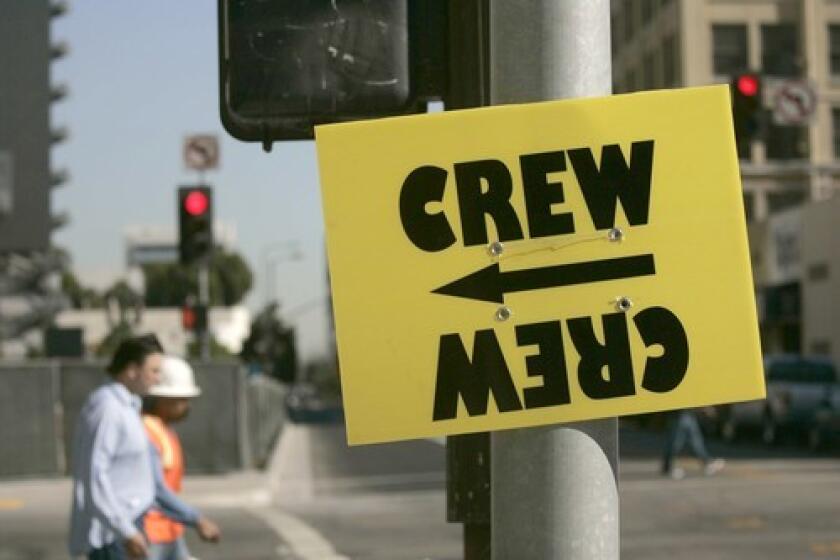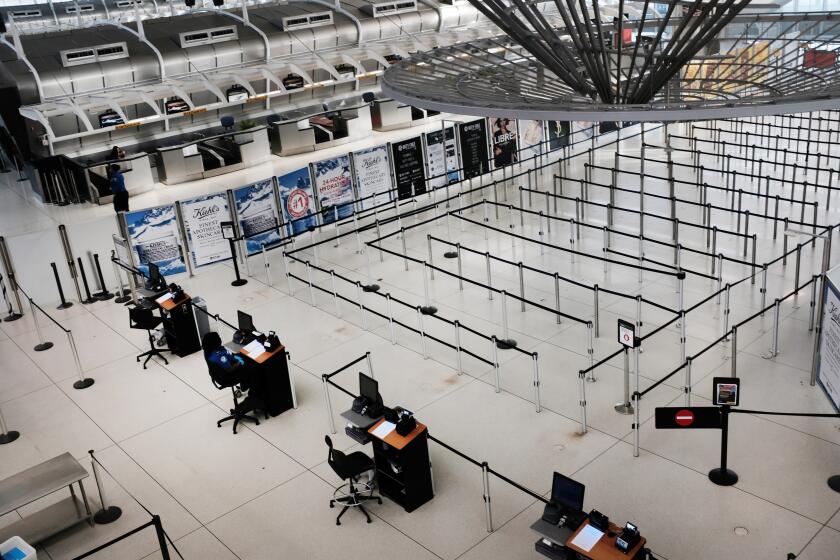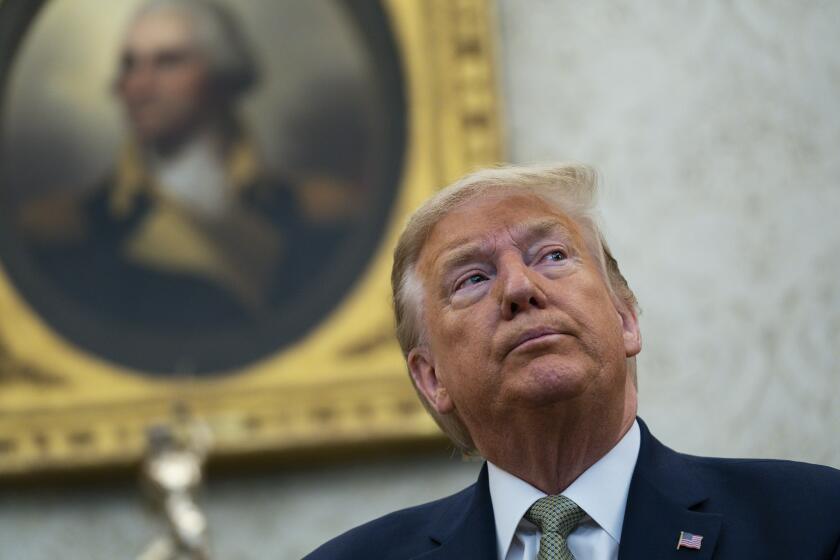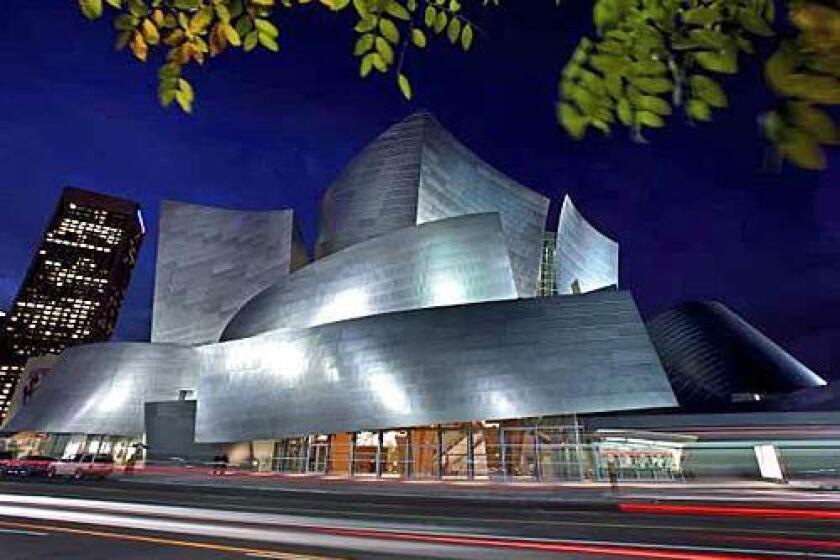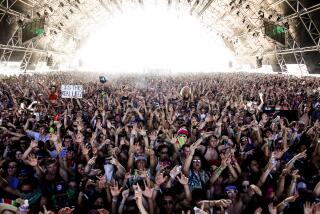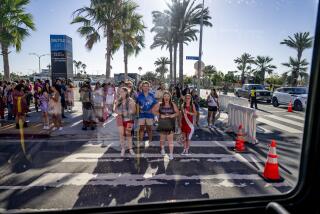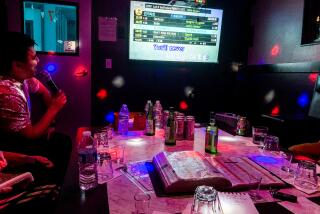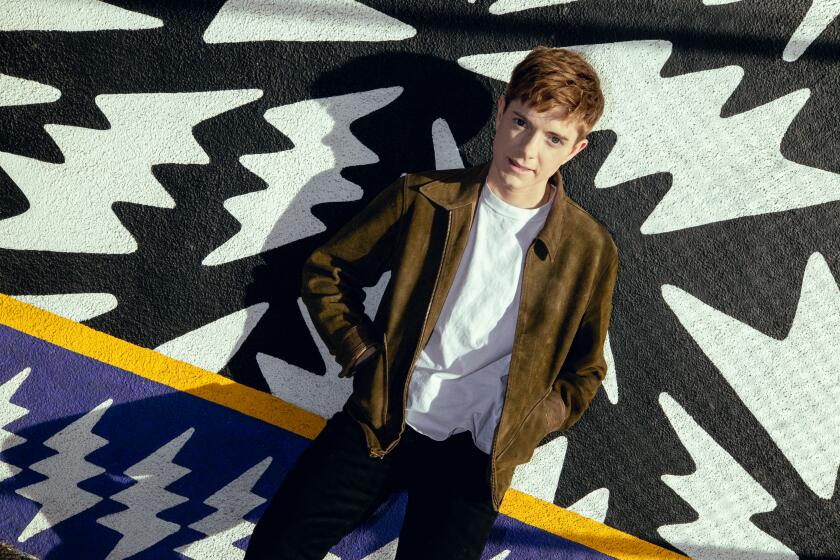Can L.A. nightlife survive the coronavirus?
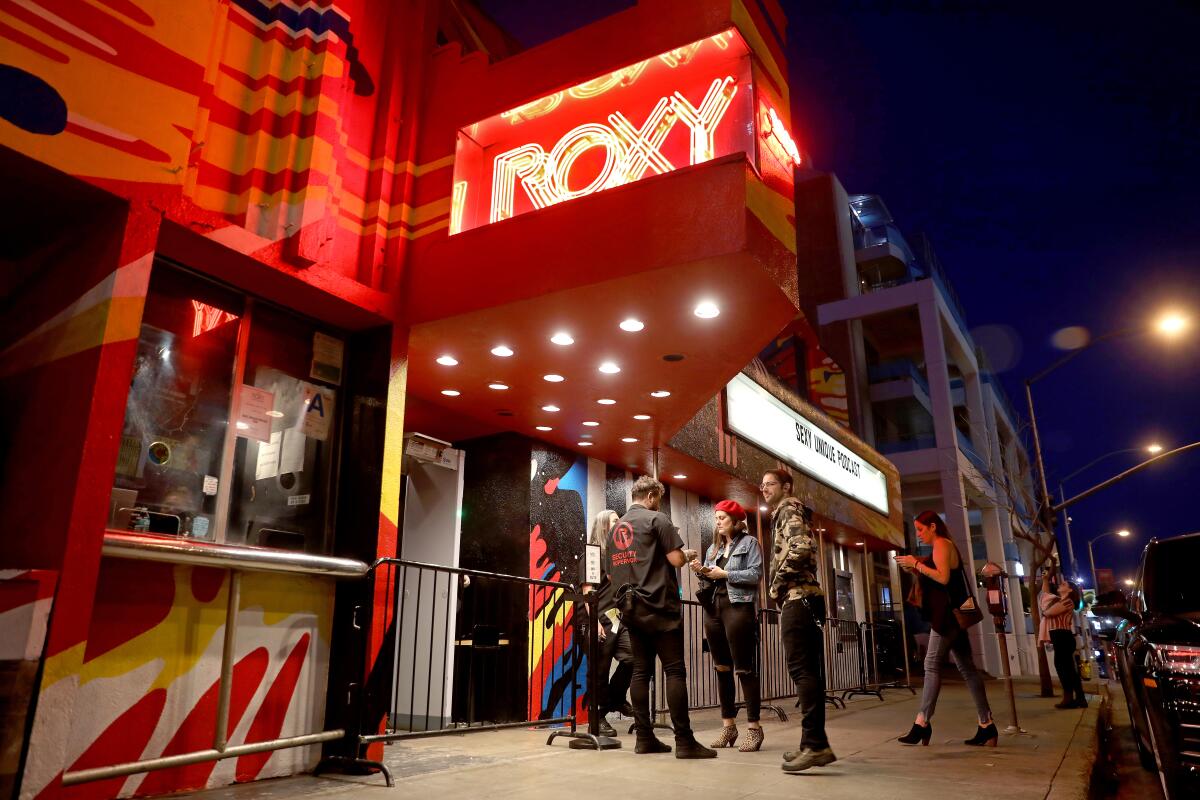
- Share via
Just before Noah Cyrus walked onstage at the Roxy on Tuesday night, Gogo Morrow showed off how she was preparing for concerts in the age of coronavirus.
“We figured out a whole new way to greet each other,” the 28-year-old said and extended a foot to tap toes with her friend Tayler Green, 27. Both live in L.A. and are big live music fans. They had decided not to let the spread of COVID-19 stop them from enjoying their nightlife. As Cyrus played her trap-pop single “Live or Die” to the sold-out crowd, the virus was on their minds, but it hadn’t kept them barricaded at home. Not yet at least.
“I’m definitely washing my hands a lot more,” Green said. “But it’s not like ‘OMG I’m never going out again.’ ”
Governments and health officials around the world are trying to mitigate the spread of the coronavirus outbreak.
They might have felt differently just a couple of days later. After a week when most travel from Europe was banned, Coachella was postponed until October, the NBA season was suspended and the country finally accepted that a pandemic is truly spreading, going out to concerts was both a way to cling to normalcy and, perhaps, a pleasure that should stop immediately.
Over two nights, The Times went to various local shows to see how music fans were reacting to the pandemic and to get a glimpse of how the city’s live music scene may change as the reality of coronavirus sets in.
Some fans seemed cavalier about it all, making jokes with friends and pressing the flesh in crowds from Highland Park to West Hollywood.
Now those nights feel like a last gasp before the music stopped.
On Wednesday, California Gov. Gavin Newsom recommended that all gatherings of over 250 people should be canceled. The following day, Live Nation and AEG, North America’s largest concert promoters, announced that they were suspending all of their tours currently on the road, domestically and internationally.
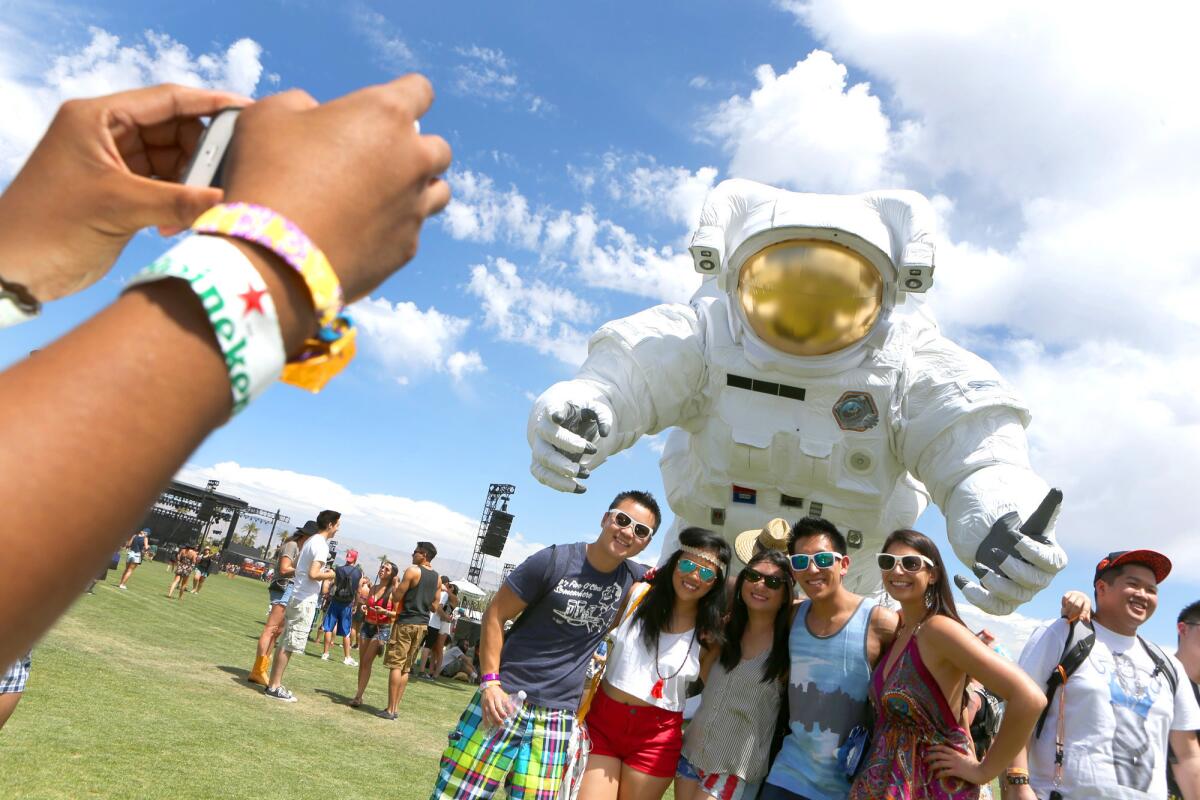
Andrew Odom is a member of the Los Angeles Nightlife Alliance, an activist group that works with nightlife promoters to improve venue safety. Usually, its work is more focused on things like fire prevention and training staff how to intervene in a suspected drug overdose. But coronavirus is a whole new worry, one that even seasoned promoters are trying to get a grasp on.
“Our community’s health and the health of our loved ones is paramount,” he said. “We recommend that we follow the social distancing guidelines that the state of California has issued, whether through limiting the size of events or postponing them all together.”
Film crews in Los Angeles are starting to face restrictions on filming in the city as legislators seek to halt the spread of coronavirus.
Government officials should also recognize that nightlife is a livelihood for many people, he added, and a particularly vulnerable one in this time. “Many within our community rely on nightlife as their sole source of income,” he said. “We also call on the state to provide assistance to members of the service community and to call for an end to any evictions during this crisis.”
On Tuesday, outside the longtime Hollywood club the Hotel Cafe, which serves as a hub for singer-songwriters, Alissa Torvinen and Jean Baptiste had just seen a set by Sunny Ozell. Both said that they were acutely aware of the virus’s spread.
“I’m a germaphobe, so this is hard,” Baptiste said.
Torvinen added that both she and Baptiste have become hyper-vigilant about cleanliness. “If we are eating, we wash before we eat. We both have these hospital wipes and we wipe down our phones and we wipe down our door handles after we wash our hands.”
Asked if they’d be attending any big music events in coming months, both offered a firm no. “With situations where people are traveling in and out from different places, you can’t risk it,” Baptiste said.
Torvinen added that the day before she sent what she called “a DIY Purell kit” to her grandmother in Florida, who was braving the outbreak to see a concert by pop crooner Josh Groban.
But they still had a sense of humor about it all. Baptiste quipped that “I don’t think there’s going to be any coronavirus at a Josh Groban concert.”
Even before President Trump announced U.S.-Europe travel restrictions, United Airlines said it was prepared for its revenue to fall as much as 70%.
Public health officials would probably disagree, though. As the week went on, the bad news rolled in. The NHL season was called off. Tom Hanks and Rita Wilson announced they’d contracted coronavirus. The U.S. government’s response felt less than reassuring to many people, to say the least. The jokes got harder to make.
L.A. concert industry professionals were particularly starting to feel nervous.
At the Brite Spot diner in Echo Park on Thursday morning, Phil Riehl was waiting for the call that might determine the rest of his year of work. He’s the stage manager for Bon Iver and Childish Gambino and has a European arena tour with Bon Iver planned for the spring.
For big tours, insurance would help cover some of the costs of any disruptions, he said. But for local clubs and their working-class venue staff, or for artists without the backing of big firms, the loss of tour dates could be a slow-rolling disaster for their livelihoods.
“It’s at the cusp of being a bigger worry. Big shows will have insurance, but for small clubs that need to keep their doors open, this is the last thing they need,” Riehl said. “Artists are responsible for a lot of people’s jobs. If shows start getting canceled, then tours get called off and the dominoes start to fall.”
He’d been helping friends find temporary work in clubs when their international tours were affected. But he understood the predicament that artists, managers and everyone else is in right now.
“A tour bus is like a cruise ship on wheels,” he said. “No one has experience dealing with a pandemic on tour. Do artists want to take that risk?”
President Trump’s halting efforts to respond to the coronavirus crisis have spotlighted long-standing problems in his White House -- lack of expertise, sloppy staff work, poor execution -- that undermine his effectiveness.
Entertainment companies are trying to figure that out now. Kristen Jaconi, director of the risk management program at USC’s Marshall School of Business, expects the concert industry to be immediately affected by coronavirus.
“It’s going to have a significant economic impact on sectors like entertainment and travel, where it’s all about social cohesion and opposite of social distance,” she said.
She predicts that, as coronavirus roils social spaces, there will probably be at least a temporary shift to digital life and cocooning at home. For now, packed nightclubs may start to feel more dangerous than enticing.
“Companies will have to be inventive in moving things onto virtual spaces,” she said. “When you see a soccer game played with no fans, it’s eerie, but it might be state of play for the next few weeks.”
That reality hadn’t set in fully, though, this week. At the El Rey on Wednesday, as the dance-punk band the Rapture played the first of a three-night stand, 24-year-old Dana Salas of Alhambra tried to brush it off and cut some rug on the dance floor regardless.
“I’m not too afraid, it’s just a virus like the flu,” she said, echoing the low-key attitudes that a lot of fans — for better or worse — shared at nightclubs this week. “But seeing all these people in Alhambra with masks on scares me a bit.”
Sam Thorne, 24, from Pasadena was one of them. He had a face mask packed in his bag as he hung out on the El Rey’s smoking patio.
“We were just being goofy about it, but then we realized it might actually be a good idea,” he joked.
Coachella’s cancellation was the buzz in the room, and regulars were starting to make new plans for the spring. Kevin Costa, 35, had tickets to attend the festival next month, but he saw some silver linings to the postponement.
“Now it’ll just be less hot since it’s in October, so that’s cool,” he said, laughing. “It’s definitely a problem, but it doesn’t feel like that a big of a deal yet.”
Less than a day after announcing they’re still open for business, some major Los Angeles arts companies are closing because of the coronavirus.
As this scary, strange week ground on, music fans and venue owners were beginning to grasp the dark season ahead of them. Maybe younger fans were more blasé about it all, but at Pip’s on La Brea, a jazz club in Mid-City catering to a bit of an older audience, Curtis Mitchell was throwing his 60th birthday on the patio. He was ebullient about his party but very aware of the stakes.
The NBA season ending was a sign that coronavirus would truly start to affect daily life, he said. But in a way, that only made him more eager to be out with friends.
“You don’t see anybody here not hugging each other or enjoying life,” he said as he embraced friends passing by en route to the bar. “Being at home alone is kind of a prison.”
The club’s owner, Derrick Pipkin, agreed. Business hadn’t dropped off yet, he said, and his club was packed with dapper jazz fans dancing like any other night. But as they ordered drinks, their eyes were warily watching a TV behind the bar with a chyron scroll of bad news.
“The scariest thing is that I need people here,” he said. “Now more than ever, we need our neighborhood.”
More to Read
The biggest entertainment stories
Get our big stories about Hollywood, film, television, music, arts, culture and more right in your inbox as soon as they publish.
You may occasionally receive promotional content from the Los Angeles Times.
